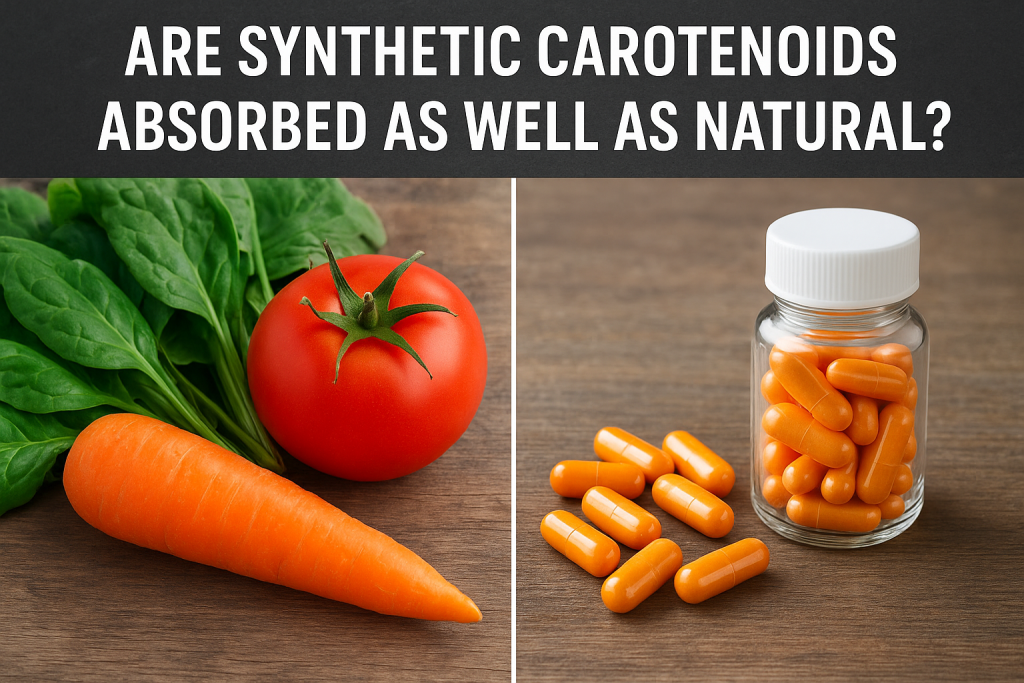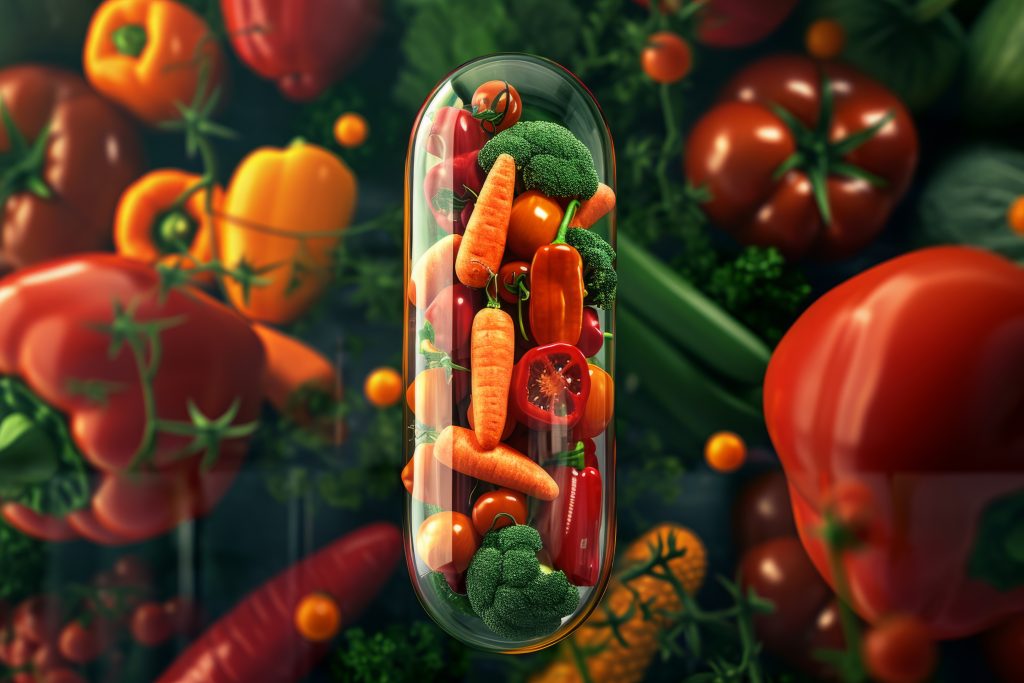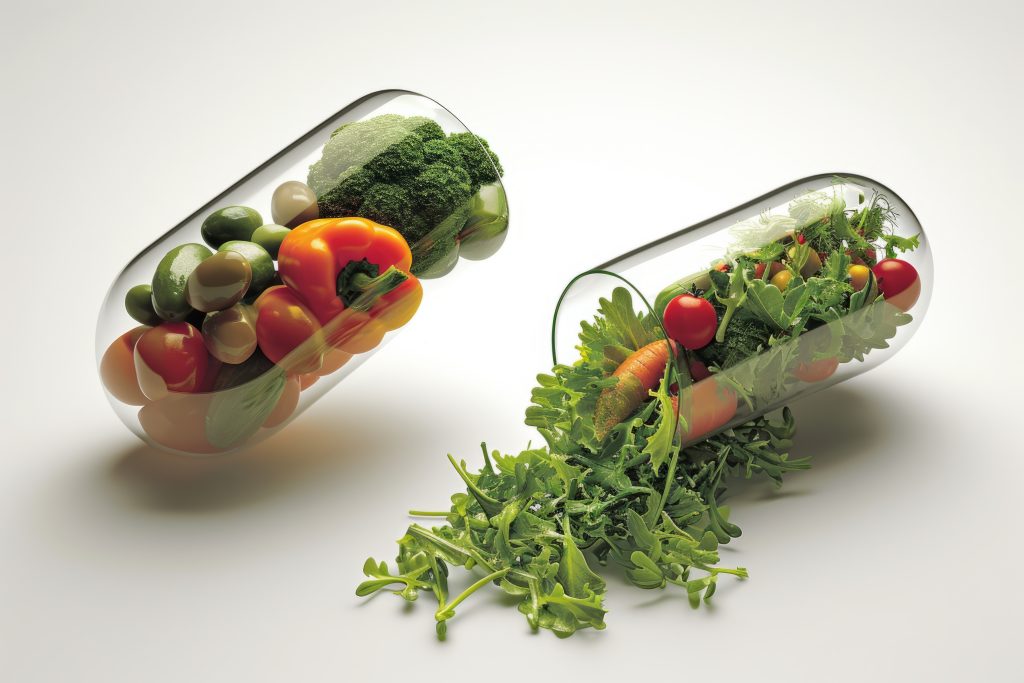
Introduction
Carotenoids are natural pigment that gives fruits and vegetables their color hues. Not only color, they are powerful antioxidant that protect our cells, strengthen immune, support vision, and help the skin health. That’s why carotenoids have become popular ingredients in diet supplements.
One thing you should know: not all carotenoids are the same. Some supplements use natural carotenoids which is extracted from natural materials such as plants, algae, or flowers. While other supplements use synthetic carotenoids which is lab-made material designed to copy their natural counterparts. They might look identical, but when it comes to absorption and effectiveness, your body can tell the difference.
So, are synthetic carotenoids absorbed as well as natural? In this blog, we’ll explain about how absorption difference affect our health and the difference between natural and synthetic types.
Carotenoids and Why They Matter

What Carotenoids Do
Carotenoids aren’t just a pigment, they are important nutrients that can help eyes, skin, heart and immune.
- Eyes: Lutein and zeaxanthin protect the retina from blue light and damage.
- Heart: Lycopene helps blood vessels stay healthy.
- Immune System: Beta-carotene turns into vitamin A to support immunity.
- Skin: Astaxanthin shields skin from sun damage and aging.
To feel the effect from the benefit, carotenoids must first absorbed into our bloodstream.
Why Absorption Matters
Even though a supplement has a lot of carotenoids, it won’t take any effect if your body can’t absorb them. Absorption, or bioavailability, is how much of a nutrient your body can actually use.
What Affect Absorption

Here are the things that affect absorption:
- Source : Natural or Synthetic
- Food type : Whole foods or isolated nutrients
- Your body : Gut health, lifestyle, genetics
Natural carotenoids absorb better than Synthetic ones.
Natural vs. Synthetic Carotenoids

Natural sources
Natural carotenoids come from from fruits, vegetables, and plants. They also come with other nutrients that can help with absorption.
Synthetic Carotenoids
Synthetic carotenoids are chemically made in a lab. They look identical with the natural one, but they don’t have extra nutrients, which is why synthetic carotenoids are harder to absorb.
Why Structure Matters
Synthetic carotenoids may have forms that cause your body can’t absorb well. On the other hand, natural carotenoids are the forms your body recognizes, because your body designed to use nutrients from food, not lab-made copies.
Natural Wins on Absorption and Safety

Natural Wins on Absorption and Health Benefits.
- Natural carotenoids are absorbed more effectively and deliver stronger results.
- Synthetic versions may not match the bioavailability or long-term safety of natural forms.
- Choosing natural, verified carotenoid supplements ensures your body actually gets the benefits on the label.
Get the Carotenoid Benefits Your Body Deserves
Most supplements rely on synthetic carotenoids, which your body may struggle to absorb. That means you might not get the full antioxidant protection you’re counting on.
That’s where our natural carotenoid approach comes in.
We help you close that gap with:
-
High-bioavailability natural carotenoid supplements your body can actually use
-
Carotenoid scans to track your absorption and antioxidant levels
-
Personalised guidance to match the right supplements to your health goals
-
FREE 30-Minute Zoom Clarity Session to plan your next steps
This is your chance to nook your FREE 30-Minute Zoom Clarity Session with me. This is your chance to get personal guidance to keep your momentum going.
Smarter Supplement Choices Start with Knowledge
So, are synthetic carotenoids absorbed as well as natural ones? Not really. Natural carotenoids are easier for your body to absorb and deliver stronger antioxidant benefits.
Treat supplements not just as products, but as tools to protect your long-term health. And when you’re unsure which ones truly work, we’re here to guide you toward the natural options your body can actually use.
✅ Take Action Now
Unlock the Power of Natural Energy
Natural carotenoids aren’t just absorbed better, they fuel your body the way nature intended.
👉 Join our 7-Day Energy Booster Program and discover how natural nutrients, simple food swaps, and daily routines can:
-
Improve energy without relying on synthetic supplements
-
Support better absorption for long-term health
-
Keep you feeling sharp, focused, and energized all day
Start today, your natural energy reset begins in just 7 days!
@socialavengers Natural carotenoids and Syntechnic carotenoids look the same in a lab, but your body reacts differently to each of them. That’s why natural carotenoids may cost more… but they also deliver more! #AreSyntheticCarotenoidsAbsorbedAsWellAsNatural #NaturalCarotenoids #BusyMumHealth #EnergyForMums #HealthyChoicesSG #EyeHealth #SocialAvengersTribe #CarotenoidCheck #NaturalVsSynthetic #plantbasedwellness ♬ original sound - Social Avengers
Frequently Asked Questions
1) Are synthetic carotenoids absorbed as well as natural ones?
Not usually. Studies show that natural carotenoids are absorbed better because they come with supporting nutrients and occur in forms your body recognizes. Synthetic versions often have lower or inconsistent bioavailability.
2) Can synthetic carotenoids still provide health benefits?
Some synthetic carotenoids do get absorbed, but their effectiveness is often weaker compared to natural sources. In some cases, such as high-dose synthetic beta-carotene in smokers, they may even pose risks.
3) How can I improve carotenoid absorption from supplements or food?
Take carotenoids with healthy fats like olive oil, avocado, or nuts. Since carotenoids are fat-soluble, pairing them with dietary fats significantly increases absorption.
4) How do I know if a carotenoid supplement is natural?
Check the label for specific sources such as marigold (lutein/zeaxanthin), tomatoes (lycopene), carrots (beta-carotene), or microalgae (astaxanthin). Avoid vague terms like “nature-identical,” which usually signal synthetic origins.
5) Are natural carotenoids safer for long-term use?
Yes. Natural carotenoids from foods and plant-based supplements are generally safe and beneficial long-term. Synthetic carotenoids, especially in high doses, have been linked to negative effects in some populations.


